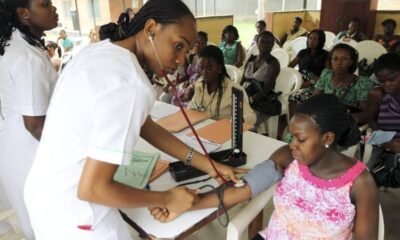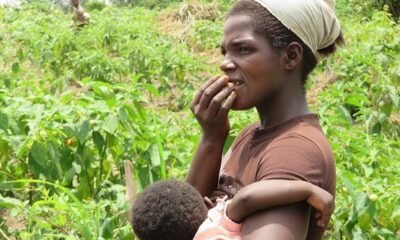News
UNICEF Raises Alarm Over Pregnant Women, Babies In The South East

Concerning pregnant women and babies in Nigeria’s south east, there is reason to worry, the United Nations Children’s Emergency Fund (UNICEF has said.
The fund which statutory function is on children globally, has been instrumental to the holding of a lot of health and nutrition programmes and projects for both children and mothers in Nigeria.
Its latest worry centres on two critical issues: the rate of anemia amongst pregnant women and also, low level of adherence to best breast feeding practices, which is affecting the total wellbeing of babies and their mothers.
As an example, UNICEF says the range of anemia amongst pregnant women has become alarming and should be the concern of every well-meaning person.
READ ALSO: Heath Centres Charging Pregnant Women N10k Delivery Fee In Trouble
This it added currently hovers around 48 per cent and 61 per cent.
These facts were made bare by Mrs Cristian Munduate, UNICEF Representative in Nigeria, while speaking at Awka, at the First Quarterly Review Meeting of the South-East Zone Traditional Rulers’ Committee on PHC Delivery (SETRC) in Awka.
The review meeting was organised by the Federal Ministry of Health in collaboration with the National Primary Healthcare Development Agency (NPHCDA).
Represented by Juliet Chiluwe, UNICEF Chief Field Office Enugu, Munduate added that the situation was worse in Anambra and Imo states as they accounted for more than 30 per cent and 25 per cent respectively for cases of anemia amongst pregnant women.

Women and their children awaiting hospital attention
Even the practice of commencing breastfeeding within one hour after a child is born and exclusive breastfeeding for six months was also low in the region according to the UNICEF official.
READ ALSO: MEN BEWARE: Why many women now fake pregnancies
The figure according to her ranged from 13 per cent to 41 per cent.
“It is even declining in Imo, Abia, and Anambra states. Statistics showed a higher downward trend of 13 per cent, 19 per cent and 24 per cent respectively.
“The role of exclusive breastfeeding in the reduction of infant deaths and accelerating growth of the baby, and benefits to the family, the community, and the nation cannot be over-emphasised.
“If there is only one Sustainable Development Goals target that Nigeria can easily achieve, it is that of birth registration (SDG16. Indicator 9) but unfortunately, this is also declining in almost all the states.
READ ALSO: 10 Best foods to boost fertility naturally
“About 1.25 million children in the South East are expected to be registered this year but less than 10 per cent of this has been achieved so far,” she said.
Because of the importance exclusive breast feeding, she appealed to mothers to go back to the practice in their interest and the interest of their babies.



























